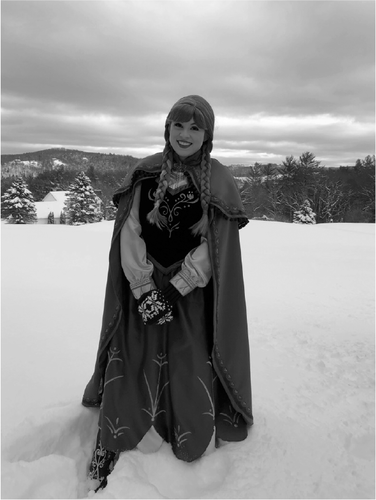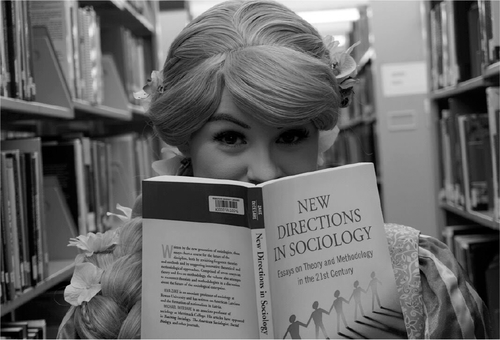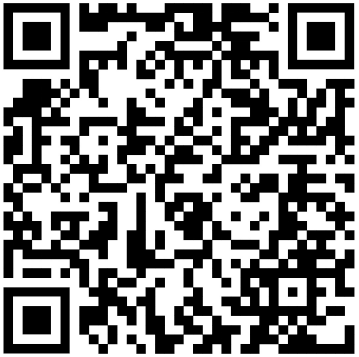Princessing: The Magic of Impression Management
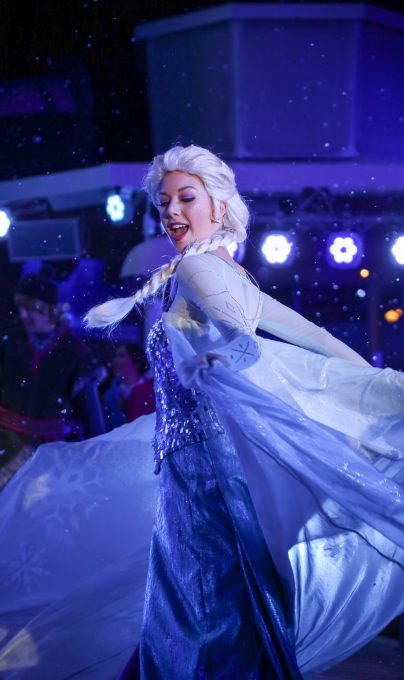
Fictional princesses have new expressions beyond toys, motion pictures, and theme parks (e.g., Disney). In an emerging gig-based, non-commercial industry, young women presenting people perform as princesses in interactive, non-staged events booked for children’s entertainment. As of yet, there is no comprehensive count of active princesses; however, preliminary interview data indicate major metropolitan areas have several hundred princess staffing companies. Meanwhile, princesses in rural areas may service 100 miles in any direction. Prominent princess Instagram accounts boast 100,000+ followers, with 1,000s of smaller-scale operators with 100+ followers each. Many workers will never be accounted for as they cannot register as princesses and frequently enter and exit the profession.
In lived interactions, princessing involves mastering what Goffman called “impression management.” “On-stage,” actresses engage strangers. I do this. I vocalize, gesticulate, and emote in a prescribed constellation of behavior appropriate for a fairytale world. In the build-up, however, to going on-stage, my backstage is porous.
Backstage Starts Now
The final step is Rapunzel’s hair. Composed of separate pieces, stretching to the floor, it is always a pain to get into. Once on, I fasten the braid to my corset, reducing the burden on my neck, but also so children can’t pull it off.
The impression starts now. My “character attendant” peeks out the window. Are the neighborhood kids awake? The coast is clear. We shuffle out of my apartment to my car.
Children cannot see a princess “in the wild.” Princesses don’t live in apartments. They certainly don’t carry cell phones. We don’t get dressed backstage at events. We don’t finish our make-up in the privacy of our cars. We “arrive” fully formed.
I forgot to eat while getting ready. I see a Dunkin’. Princesses definitely don’t eat, in a booth. The drive-thru is the only option, and a princess has to eat. Today I’m getting the “I don’t notice you’re a princess” vibe. The cashier politely hands us our coffee and breakfast sandwiches. Looks right at me; visually stunned. Says, “have a nice day.” Forcefully shuts drive-thru window. It’s funny every time.
Upon arrival, we circle the block to identify a well-hidden parking spot. It has to be far enough away from the party location that my exit from the car goes unseen. I need that “dropped off by a magic pumpkin” entrance, but we’re early, so I snap a couple selfies from the driver’s seat, blueberry latte in full view. The picture is cute, but I can’t post them to Instagram. It is a breach of character integrity to be captured on a “magic mirror” (i.e., camera) with fairytale-inappropriate objects.
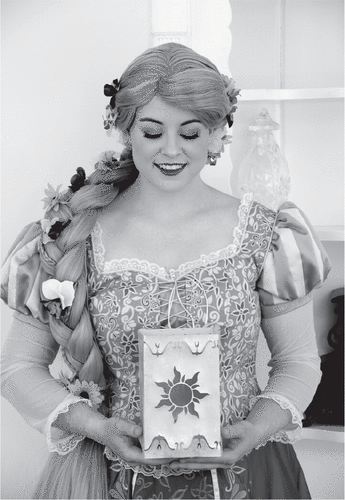
Frontstage at the event
Walking to the house, I am nervous. Being Rapunzel is hard right now (for me, not her). My boyfriend, who played my prince, left me. Being Rapunzel without him is challenging, but I check those emotions at the door.
I ring the bell. A three-year-old in a tiny version of my gown swings open the door. Her eyes light up. “Punzie!” she says; “Mom, its Rapunzel!” While I am a stranger to her, Rapunzel is not. She invites me in. I follow, prince-less, hearing children in the next room. “This is the best day ever. It’s so nice to meet you all!” I ask if they want to take “portraits” with me. They volunteer information about their hobbies, schooling, and other things “that I also do back in my castle,” I tell them. A parent snidely asks me my “real” name.” There is always one of them. “I’m Rapunzel, of course!” Interacting with the children, I’m distracted by a momentary sadness, steady myself, and the party goes on.
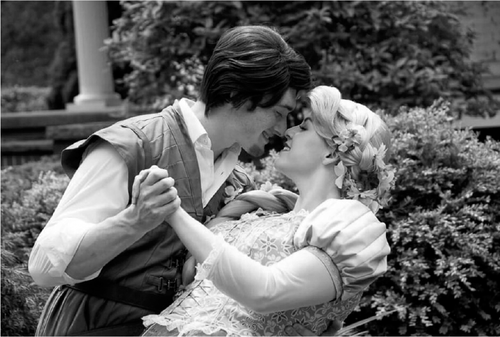
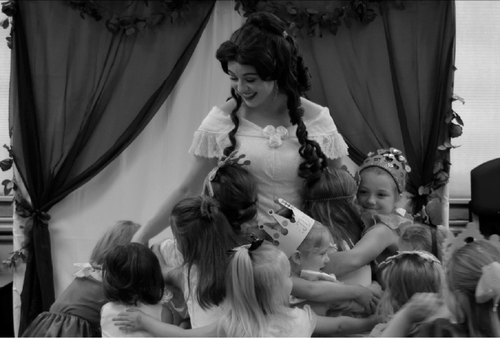
Before elaborate goodbyes, I spot the father starting to hand me an unmarked envelope. I spin away. Back to the children, I pass the payment to my attendant. His daughter doesn’t notice a thing. She can’t be two feet away from me. “Are you going home?” she pouts. “Yes,” I say, “my castle is quite a journey, but my horse is the fastest in the kingdom. We’ll be there in no time!” I hug each child. I wish them a magical day. Walking backward out of the door, I blow kisses goodbye to the crowd.
After walking three blocks, fully out of sight, we get in the car, finally “off stage.” We critique the event, ourselves included. After a few minutes, we start the car, en route to the second of three events today.
Conclusion
The term “princessing” captures the active and performative aspects of our work. Princesses aren’t a thing; they only emerge in a series of carefully managed and curated moments of their active portrayal. Princessing is “impression management.” It is something we actively “do” because, being fictional, princesses must be simulated to exist in the real world and manage the impressions of onlookers. This is mentally and emotionally draining work, even if it is rewarding to bring a princess momentarily to life and, in turn, grant the wishes of children. On a related dramaturgical note, princessing blurs any simple distinction that cleanly separates on-stage from off-stage behavior. Actresses can be effectively on-stage hours before or after an event, when one might presume they have the freedom to engage in personal off-stage interactions. An obvious example is not being able to buy gasoline in costume; a non-obvious example is accidentally slipping into Rapunzel’s vocalization, exhausted, while ordering dinner. “Are you okay?” asks the cashier. “I don’t know,” I reply; “I haven’t been myself all day.”
